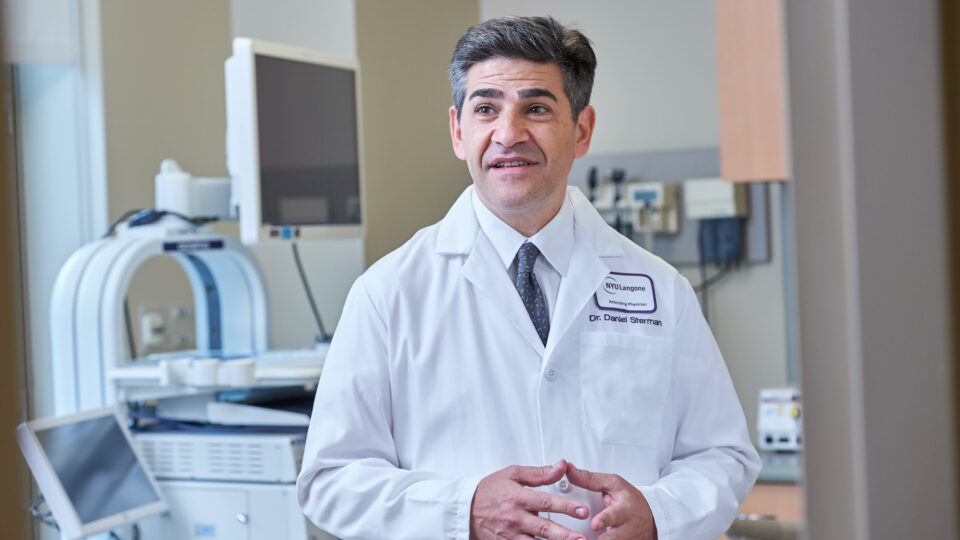Mary L. Gemignani, MD, MPH, an acclaimed surgeon and expert in treating breast cancer, was recently named chief of the breast surgery division at NYU Langone Health’s Perlmutter Cancer Center. She is also a member of the Department of Surgery.
With nearly three decades of experience, she has held several leadership positions and made numerous contributions to the field in both research and education.
Here, Dr. Gemignani shares her perspective on leadership and training, spotlights key advancements in the field, and discusses her goals for improving the care of young women with cancer.
The Value of Strong Leadership
Physician Focus: Dr. Gemignani, what motivated you to take on leadership roles in your field?
Dr. Gemignani: In today’s healthcare landscape, the need for strong leadership is greater than ever, as it is essential for delivering high-quality patient care. The rapid advancement of clinical technologies like robotics, artificial intelligence, and precision medicine warrants the ability to assess how to successfully incorporate and leverage these innovations. When a healthcare team is not working together effectively, or lacks direction, patients often pay the price. Understanding this early in my career, I wanted to make a difference.
The field of oncology, specifically women’s health and breast cancer, captured my attention in medical school. For the past two decades, my focus has been leading multidisciplinary teams in a variety of research and educational initiatives.
Physician Focus: What are your plans for education and surgical training at NYU Langone?
Dr. Gemignani: Great question. It’s an exciting time to be an educator in surgical oncology—the landscape of education has changed to include roles and opportunities that expand beyond the operating room. I’m thrilled that we’ve been able to attract the best and brightest medical students and physicians to our field. Early exposure to the field of oncology can spark students’ interest in becoming a cancer physician.
“The field of surgery is becoming more multidisciplinary, and the traditional authoritative leadership approach of surgeons is no longer acceptable.”
Mary Gemignani, MD, MPH
One of my passions is training future leaders. As I previously mentioned, strong leadership is essential for delivering high-quality patient care. For almost 15 years, I directed one of the nation’s leading breast surgery fellowship programs, which produced many of the leaders in the field today. The field of surgery is becoming more multidisciplinary, and the traditional authoritative leadership approach of surgeons is no longer acceptable.
I took a unique approach to training by ensuring my students gained more than just surgical skills. One example is by providing leadership-specific feedback, as current feedback mechanisms largely focus on clinical or technical skills.
It is crucial to provide formative feedback to reinforce positive leadership behaviors and correct problematic ones. Here, I plan to do the same.
Advancements in Estrogen-Receptor-Positive Breast Cancer
Physician Focus: You’ve been a breast surgeon for about 25 years. From your perspective, what is the key research area pushing the field forward?
Dr. Gemignani: There is such a diversity—it’s really hard to pick just one.
In the domain of imaging, the FDA recently approved the use of 18F-fluoroestradiol/positron-emission tomography (FES/PET) for patients with estrogen-receptor-positive (ER+) recurrent or metastatic breast cancer. My team published on the feasibility of the technique before it was commercialized by a biotech company.
This advancement significantly improves our ability to stage ER+ cancer. While targeted therapy is effective for patients with ER+ disease, the evaluation of ER expression with immunohistochemical staining of biopsy samples is limited by factors such as sampling error, false negatives, and difficulties accessing biopsy sites. Serving as an adjunct to biopsy, FES helps to identify a target lesion for confirmatory biopsy, provide in vivo evaluation of biopsy-proven ER+ disease, and assess spatial and temporal ER heterogeneity.
As experience with the tracer grows, expanded indications are possible, including use as a predictive biomarker for targeted therapy.
Supporting Young Women Who Have Cancer
Physician Focus: In addition to pursuing clinical advancements, you are dedicated to promoting holistic care, especially for young women with cancer. Can you tell us more about this work?
Dr. Gemignani: Yes. At my previous institution, I was co-director of the Young Women with Breast Cancer program, offering a full spectrum of care, support, education, and research for young women diagnosed with this disease.
Young women with breast cancer—aged 45 or younger—face unique challenges, including interruption of work or school, treatment-related infertility, and issues with disruption of parental responsibilities. We conducted research to uncover the most pressing issues that hold significance for this population. I am now working to ensure that our care delivery prioritizes and effectively addresses those issues patients find most important.
“The impact of treatment on fertility is important to young women; they value the ability to pursue fertility-preserving options.”
In a similar vein—my research interests extend to quality of life studies and patient-reported outcomes, specifically focusing on minimizing the side effects of treatment in young women with breast cancer. A good example is cytotoxic chemotherapy—investigating the types of chemotherapy, their doses, and treatment durations that result in the least amount of gonadal toxicity. The impact of treatment on fertility is important to young women; they value the ability to pursue fertility-preserving options.
Elevating Care, Expanding Access
Physician Focus: What are your top priorities as you step into your new role?
Dr. Gemignani: In my new role, I’m excited to work with other leaders across NYU Langone to continue to standardize the delivery of breast surgical care and expand access to clinical trials at all sites, including those in Brooklyn and on Long Island.
Bringing my experience to a larger health system, I’m also excited about the opportunity to collaborate with other leaders within the organization. Take NYU Langone’s Fertility Center, where our patients, particularly young women with breast cancer, have access to the latest techniques for fertility preservation. Working together we can improve the quality of life for those patients during and after treatment.
Alone, I cannot achieve all of my research goals. Here, we have a unique opportunity to bring together the best and brightest from a variety of disciplines.






